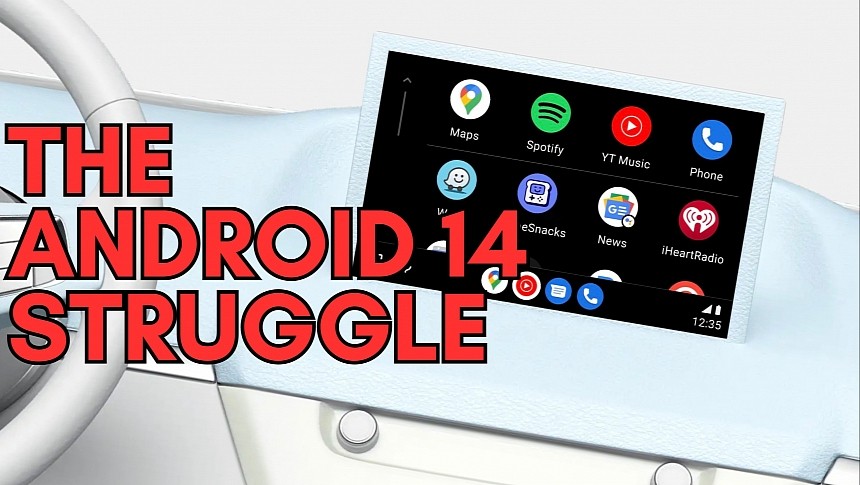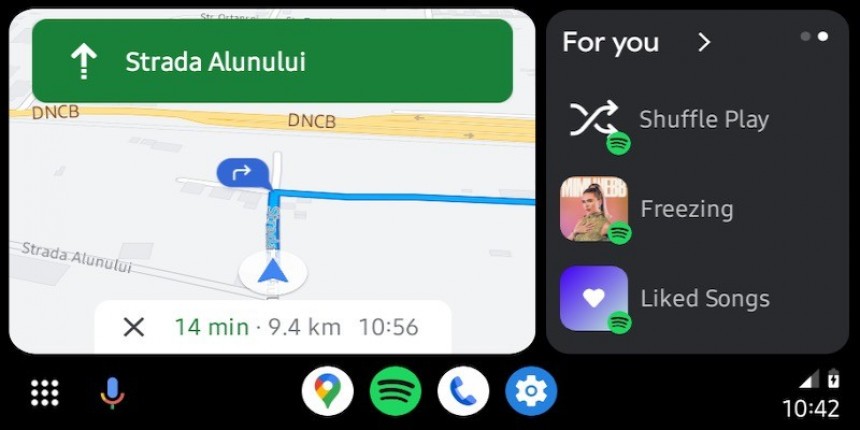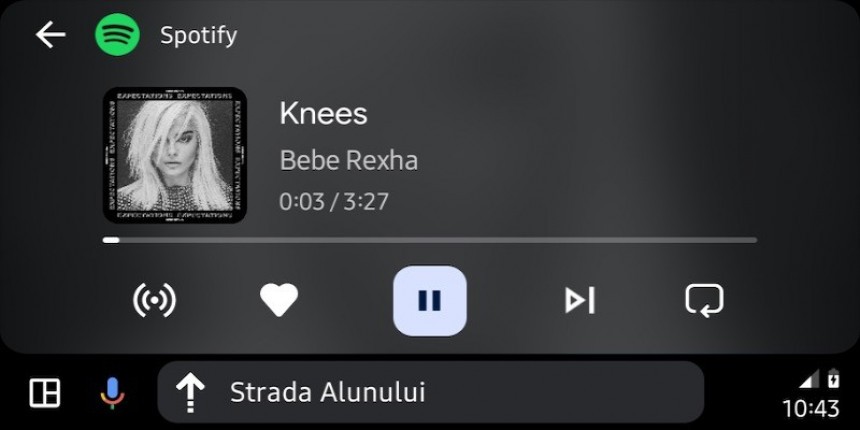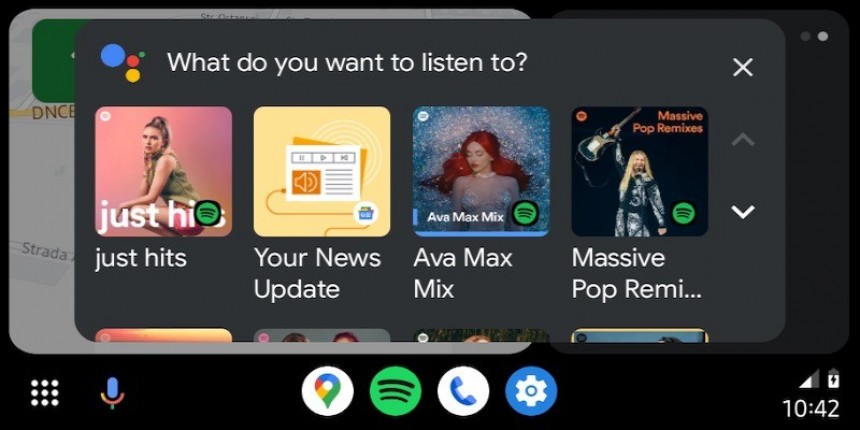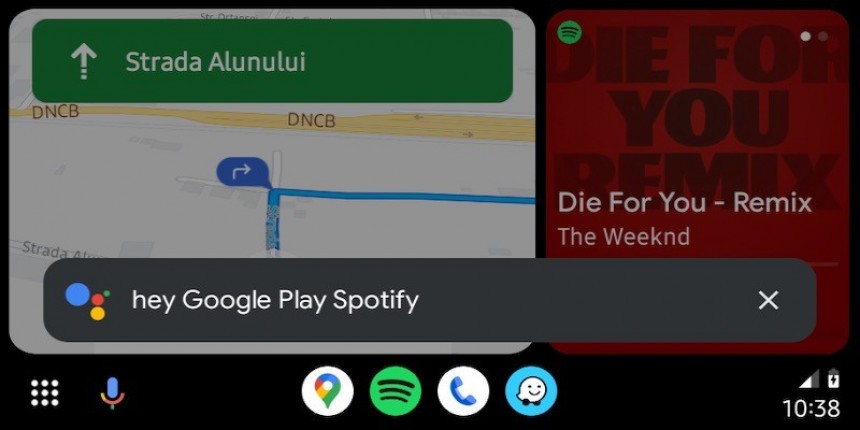If you can't see a reason to upgrade from Android Auto wired to the wireless sibling, you probably never used the app without a cable before.
In addition to the obvious benefits, Android Auto wireless should also offer improved connection stability and reliability.
The first thing you get when running Android Auto wireless is the extra convenience. You no longer have to run the app with a cable, meaning you can forget about cords in your cabin, keeping everything more organized.
Additionally, Android Auto wireless is also easier to use. You can keep the phone in a pocket or a backpack, and the moment you start the engine, it connects to the head unit, launching Android Auto without further input on your side.
But the biggest benefit is the improved stability and reliability. If you've been using Android Auto for more than a few weeks, you should know that cables are the culprits for a frustrating number of problems in Google's world. A bad cable can wreak havoc in your car, causing glitches like random disconnects, broken audio, or the head unit not detecting the phone.
As a result, it's not surprising to see so many people buying wireless Android Auto adapters. These devices allow them to convert the wired connection to wireless in a matter of seconds, making the experience overall significantly more convenient.
Enter Android 14.
As I've told you on several occasions, Android 14 isn't by any means the great update that Android Auto users expected. Despite not bringing any significant improvements to the driving experience, Android 14 should still further polish Android Auto, at least addressing some of the known bugs that users have already reported.
For example, one of the most widespread bugs that've been around for months concerns the Coolwalk update. The lower part of the screen sometimes freezes, blocking users from switching apps and interacting with the applications on the screen. The issue was first reported shortly after Google started the Coolwalk rollout in January, and users are still complaining of the same problem nearly a year later.
Now it looks like Android 14 also breaks down Android Auto wireless.
One of our readers told me in a message that updating to Android 14 prevents the mobile device from connecting to the head unit to launch Android Auto. The infotainment system no longer detects the phone, as if they weren't paired.
None of the workarounds available in the Android Auto world restored the app after the update to Android 14. Our reader told me they cleared the cache and the data of the Android Auto app, reinstalled it from the Google Play Store, removed all updates, and even manually downgraded to an earlier build to no avail.
All signs suggest that Android Auto suffers from a corruption issue hitting the connection between the phone and the head unit. The most obvious workaround is a complete reset of the connection profiles, and when starting from scratch and pairing the phone and the head unit again, everything should work correctly. However, our reader says this doesn't make a difference.
I searched the web and found several other users complaining of the same problem in their cars. Someone says they encountered the error with a Google Pixel smartphone, while another user claims they struggle with the same behavior on a Samsung device. It doesn't look like the bug has any preference when it comes to the brand exhibiting this broken connectivity, and the only common culprit is Android 14.
Users on Google's forums claim the problem is more common with aftermarket head units supporting the wired version of Android Auto. Sony's devices are more often impacted, but everybody says that Android Auto ran correctly on Android 13. The problems appeared after installing Android 14 on the smartphone, with no software change happening on the head unit.
Google has already started investigating several bugs potentially caused by Android 14, but the company has yet to release fixes. In this particular case, the company says it needs more information to continue the investigation, but it's too early to tell when a fix could ship. Unfortunately, without certain information, it's hard to hope for a fix in the coming weeks, so users' only option right now is to wait.
Meanwhile, if you haven't updated to Android 14 on the device running Android Auto, I recommend you to create a backup so you can go back to Android 13 faster and more conveniently if something doesn't run as planned. The downgrade from Android 14 to Android 13 without a backup is a major pain in the neck, and you certainly don't want to go through all this hassle. If anything, you can also try updating to Android 14 on a secondary device if you want to determine the Android Auto reliability in your car.
The first thing you get when running Android Auto wireless is the extra convenience. You no longer have to run the app with a cable, meaning you can forget about cords in your cabin, keeping everything more organized.
Additionally, Android Auto wireless is also easier to use. You can keep the phone in a pocket or a backpack, and the moment you start the engine, it connects to the head unit, launching Android Auto without further input on your side.
But the biggest benefit is the improved stability and reliability. If you've been using Android Auto for more than a few weeks, you should know that cables are the culprits for a frustrating number of problems in Google's world. A bad cable can wreak havoc in your car, causing glitches like random disconnects, broken audio, or the head unit not detecting the phone.
Enter Android 14.
As I've told you on several occasions, Android 14 isn't by any means the great update that Android Auto users expected. Despite not bringing any significant improvements to the driving experience, Android 14 should still further polish Android Auto, at least addressing some of the known bugs that users have already reported.
Now it looks like Android 14 also breaks down Android Auto wireless.
One of our readers told me in a message that updating to Android 14 prevents the mobile device from connecting to the head unit to launch Android Auto. The infotainment system no longer detects the phone, as if they weren't paired.
All signs suggest that Android Auto suffers from a corruption issue hitting the connection between the phone and the head unit. The most obvious workaround is a complete reset of the connection profiles, and when starting from scratch and pairing the phone and the head unit again, everything should work correctly. However, our reader says this doesn't make a difference.
I searched the web and found several other users complaining of the same problem in their cars. Someone says they encountered the error with a Google Pixel smartphone, while another user claims they struggle with the same behavior on a Samsung device. It doesn't look like the bug has any preference when it comes to the brand exhibiting this broken connectivity, and the only common culprit is Android 14.
Users on Google's forums claim the problem is more common with aftermarket head units supporting the wired version of Android Auto. Sony's devices are more often impacted, but everybody says that Android Auto ran correctly on Android 13. The problems appeared after installing Android 14 on the smartphone, with no software change happening on the head unit.
Meanwhile, if you haven't updated to Android 14 on the device running Android Auto, I recommend you to create a backup so you can go back to Android 13 faster and more conveniently if something doesn't run as planned. The downgrade from Android 14 to Android 13 without a backup is a major pain in the neck, and you certainly don't want to go through all this hassle. If anything, you can also try updating to Android 14 on a secondary device if you want to determine the Android Auto reliability in your car.
